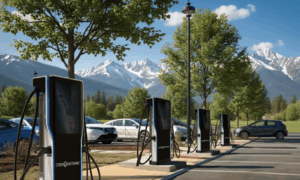
Home / EV Charging News / he Transition to Electric Cars in the Luxury Market: Examining the growing presence of electric vehicles in the luxury car segment and how it is reshaping consumer preferences and brand competition
The automotive industry is undergoing a remarkable transformation with the rise of electric vehicles (EVs) in the luxury car segment. This article explores the transition to electric cars in the luxury market, highlighting the increasing presence of EVs and their profound impact on consumer preferences and brand competition. With sustainability and innovation at the forefront, electric luxury cars are reshaping the automotive landscape and paving the way for a greener future.
Electric luxury cars offer a multitude of advantages that make them an enticing choice for discerning consumers seeking both luxury and sustainability.
One of the key benefits of electric luxury cars is their positive environmental impact. By eliminating tailpipe emissions and reducing reliance on fossil fuels, these vehicles contribute significantly to combating air pollution and reducing greenhouse gas emissions. Luxury car enthusiasts can now enjoy high-performance vehicles while minimizing their carbon footprint.
Electric luxury cars are at the forefront of technological advancements and innovative features. From cutting-edge infotainment systems and advanced driver assistance technologies to seamless connectivity options, these vehicles exemplify the convergence of luxury and state-of-the-art technology. Electric luxury cars serve as showcases for groundbreaking innovations that are reshaping the driving experience.
Contrary to common misconceptions, electric luxury cars deliver exceptional performance. The instant torque provided by electric motors ensures quick acceleration and a thrilling driving experience. With impressive power and smooth handling, luxury electric vehicles compete head-to-head with their combustion engine counterparts, if not surpassing them.
Although electric luxury cars may have a higher upfront cost compared to traditional luxury vehicles, they offer long-term cost efficiency and savings. Electric propulsion systems have fewer moving parts, resulting in reduced maintenance requirements. Additionally, electricity is generally more affordable than gasoline, providing significant savings on fuel costs. Over time, the total cost of ownership for electric luxury cars can be comparable to or even lower than that of conventional luxury vehicles.
To support the transition to electric cars, a robust charging infrastructure is crucial. Charging stations must be readily accessible and conveniently located to address the concerns of luxury car owners. Fortunately, significant strides have been made in expanding charging networks, with numerous public and private entities investing in the development of charging infrastructure. The proliferation of fast-charging stations and the integration of charging options in residential and commercial spaces are accelerating the adoption of electric luxury cars.
While the benefits of electric luxury cars are evident, several challenges must be addressed to facilitate a seamless transition to widespread adoption.
Range anxiety, the fear of running out of battery power, has been a concern for potential electric car buyers. Extending the driving range of electric luxury cars and expanding the charging infrastructure are essential steps to alleviate this anxiety. Automakers and charging infrastructure providers are collaborating to establish a comprehensive network of charging stations, including fast-charging options, along major highways and urban areas to provide reassurance to luxury car owners.
The initial cost of electric luxury cars can be higher compared to their conventional counterparts. This is primarily due to the expensive battery technology used in EVs. However, as advancements continue and economies of scale are achieved, the costs are expected to decrease. Furthermore, the resale value of electric luxury cars is a critical factor in determining their overall affordability. Manufacturers are working towards minimizing depreciation rates to make electric luxury cars more financially attractive to potential buyers.
Battery life and reliability are important considerations for consumers considering electric luxury cars. The durability and longevity of batteries directly impact the ownership experience. Automakers are continuously investing in research and development to enhance battery technology, improve charging efficiency, and address concerns regarding battery life and reliability. Transparent warranties and proactive customer support are also critical in building trust and confidence among consumers.
The growing presence of electric vehicles in the luxury car segment has ignited intense competition among automakers. Luxury brands are recognizing the shift in consumer preferences towards sustainable mobility solutions and are responding accordingly.
Leading luxury car manufacturers are proactively embracing electric vehicles to stay competitive and cater to evolving consumer demands. They are investing substantial resources in research and development to introduce captivating electric models that embody their brand identity and cater to the unique needs of luxury car enthusiasts. The transition to electric cars presents an opportunity for luxury brands to showcase their commitment to sustainability and innovation while delivering an exceptional luxury experience.
Consumer preferences play a pivotal role in shaping the future of electric luxury cars. While some consumers are early adopters and embrace the transition wholeheartedly, others may exhibit initial hesitancy due to concerns about charging infrastructure, range limitations, and unfamiliar technology. As awareness and understanding of electric vehicles increase, combined with the expanding charging network, consumer acceptance and preferences are anticipated to shift more towards electric luxury cars. Automakers are closely monitoring consumer feedback and refining their offerings to align with evolving preferences.
The future of electric cars in the luxury segment is promising. As technology advances, driving ranges improve, and charging infrastructure expands, electric luxury cars will become increasingly accessible and desirable. Luxury brands will continue to invest in research and development to enhance electric vehicle technology, offer a wider range of models, and improve overall ownership experiences. The electric luxury car market will flourish, attracting new consumers and reshaping the automotive industry.
The transition to electric cars in the luxury market marks a significant turning point in the automotive industry. Electric luxury cars offer numerous benefits, including environmental sustainability, technological advancements, impressive performance, and long-term cost efficiency. However, challenges such as limited range, initial costs, and consumer concerns must be overcome to facilitate widespread adoption. Luxury brands are actively embracing electric vehicles, leveraging innovative technologies to captivate consumers and reshape the market. As consumer preferences evolve and the charging infrastructure expands, electric luxury cars will undoubtedly shape the future of the luxury car segment.



